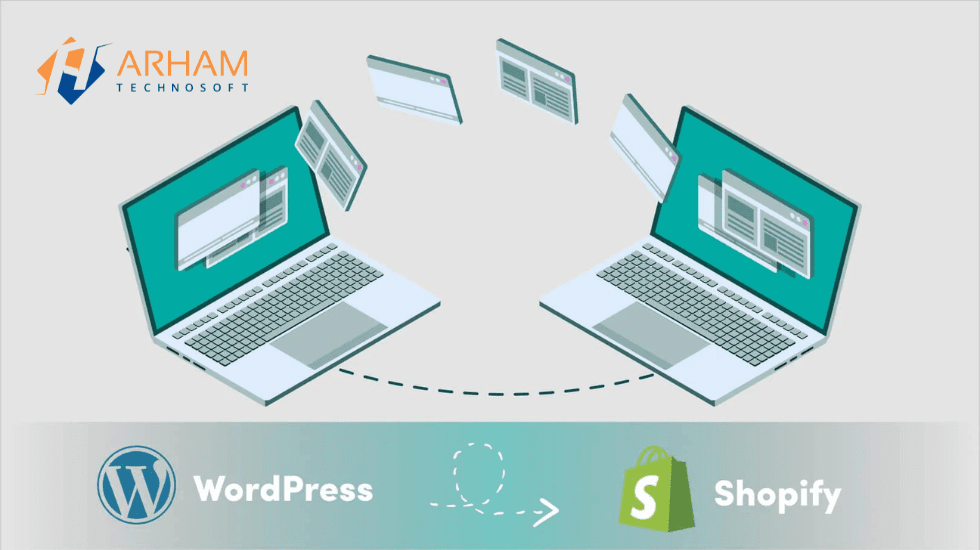In the world of e-commerce, Shopify has quickly become the go-to platform for businesses of all sizes.
With its user-friendly interface and wide range of features, Shopify makes it easy for businesses to create a professional online store and manage their sales and inventory.
In this article, we will see why migrating your WordPress store to Shopify may be the right solution, comparing features and the disadvantages of migrating Shopify WordPress to Shopify.
THE BENEFITS OF MIGRATING WORDPRESS TO SHOPIFY
Like most business owners, you want to ensure your website is running smoothly and efficiently. WordPress is an excellent platform for many businesses, but it can also be time-consuming and expensive. If you’re looking for a more user-friendly and cost-effective alternative, Shopify might be the right choice for you. Here are some of the benefits of migrating from WordPress to Shopify:
Increased functionality of Shopify compared to WordPress
Shopify has distinct advantages when it comes to functionality. For starters, Shopify is built specifically for e-commerce; Shopify comes with all the features and tools you need to run a successful online store. WordPress, on the other hand, is a versatile platform that can be used for everything from blogging to e-commerce.
Therefore, finding the right plugins and add-ons can be challenging to get the full range of features you need for your store. Additionally, Shopify offers 24/7 customer support, so you can always get help if you run into any issues.
In contrast, WordPress support is less reliable, and you may have to wait for help from the community. Shopify offers a more complete and user-friendly solution for creating and managing an online store.
Improved design capability on Shopify compared to WordPress
Anyone who has ever built a website knows that design can be complex and time-consuming. In the past, creating custom themes was primarily the domain of professional web developers.
However, several platforms today allow anyone to create a beautiful website, regardless of their level of experience. Shopify is one of the leading e-commerce platforms, and it offers several advantages over other platforms, like WordPress.
One of the main advantages of Shopify is its simple custom theme builder. With Shopify, you can create a custom theme without writing a single line of code. On the other hand, WordPress still requires users to have at least some basic coding knowledge to create custom themes.
Shopify’s simple custom theme builder is a significant plus for businesses that don’t have the budget to hire a professional web developer. In addition to being easy to use, Shopify themes are also very responsive and look great on all devices compared to WordPress, which requires Elementor to render correctly in Responsive.
This is another area where Shopify outperforms WordPress; while WordPress themes are often poorly optimized for mobile devices, Shopify themes are designed to be fully responsive from the start.
Shopify offers a much more straightforward and user-friendly design experience than WordPress. For businesses that want to create a beautiful website without the hassle, Shopify is the obvious choice.
Easier and faster scalability on Shopify compared to WordPress
Shopify is easy to use and scale platform. There’s no limit to the number of products you can sell on Shopify, and the platform is easy to manage. With Shopify, you can start selling immediately and scale your business as you grow.
Shopify is also an easy-to-customize platform to tailor your store to your unique brand and style. In contrast, WordPress is a platform that can be more difficult to scale.
If you want to sell more than a few products on WordPress, you will need to add plugins and extensions, which can be time-consuming and expensive, not to mention extension updates that can crash your online store.
Shopify is the best choice for businesses that want to scale quickly and easily.
CONS OF WORDPRESS TO SHOPIFY MIGRATION
For many businesses, switching from WordPress to Shopify can be a big decision.
There are a few downsides to consider before switching to Shopify. First, Shopify is a paid platform, while WordPress is free. It means you’ll need to consider the cost of a Shopify subscription when budgeting for your website.
Also, Shopify is less customizable than WordPress, which means you may have to compromise when it comes to the look and feel of your site. Finally, migrating from WordPress to Shopify can be complex and time-consuming.
So if you’re considering making the switch, weigh the pros and cons carefully.
Possible loss of customer data during migration
Many businesses migrate from WordPress to Shopify because of the latter’s robust e-commerce features. However, there is a potential downside to this change: data loss.
If not done correctly, a migration from WordPress to Shopify can result in losing important information, such as customer orders and contact details. It can be devastating for a business if it cannot recover lost data.
Fortunately, some steps can be taken to prevent this from happening. By working with an experienced Shopify agency, businesses can ensure that their migration goes smoothly without any data loss.
Also, regular backups of all WordPress data should be made in case of unforeseen issues. By taking these precautions, businesses can ensure that their migration from WordPress to Shopify is successful without any data loss.
Possible website downtime during migration and DNS changes from a WordPress to a Shopify migration
Any downtime can have a significant impact on an online store’s revenue. Migration and DNS changes are two common causes of website downtime. Migration is often necessary when changing hosts, upgrading servers, or changing DNS, for example, to move from a Prestashop store to Shopify.
DNS changes may occur during this change. Either way, it’s important to plan and take steps to minimize the risk of downtime for your WordPress to Shopify migration. By understanding the potential risks and taking steps to mitigate them, you can ensure that your website remains accessible during times of change.
SHOPIFY IS SURELY THE RIGHT SOLUTION FOR YOU!
Moving from WordPress to Shopify with migration is a big decision. It is important to weigh the pros and cons before making a final judgment.
For some business owners, Shopify’s increased functionality and improved design capabilities are worth the risk of losing customer data or experiencing website downtime while migrating from WordPress to Shopify.
Others may decide that the stability of WordPress is more important than the benefits offered by Shopify and its online store. Ultimately, it’s up to you to decide which platform is best for your business.

